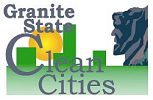
 |
Granite State Clean Cities CoalitionWelcome to the home of the Granite State Clean Cities Coalition...Promoting the use of alternative fuel vehicles in New Hampshire |
|
STAKEHOLDERS
|
New Hampshire Launches Clean Cities Coalition to Improve Air Quality, Reduce Dependence on Foreign Oil CONCORD-- The Governor’s Office of Energy and Community Services and the New Hampshire Department of Environmental Services today launched the Granite State Clean Cities Coalition to improve the state’s air quality and reduce dependence on foreign oil.
The Coalition, which supports public-private partnerships that increase the use of alternative fuel vehicles and build supporting infrastructure, was officially designated by the U. S. Department of Energy (DOE) at a special ceremony held at the New England Center in Durham. "For the future of our state’s environment and economy, we must reduce our dependence on foreign oil and look toward new technologies and new solutions to meet our energy needs," Gov. Jeanne Shaheen said. "With the Granite State Clean Cities Coalition, we are taking an important step toward encouraging cleaner, more energy efficient transportation in New Hampshire," Governor Shaheen added. "This effort will help give consumers and businesses more options for environmentally friendly transportation and assist our efforts to become more energy independent." The Granite State Clean Cities Coalition (GSCCC) grew out of a New Hampshire state government initiative known as the Alternative Fuel Vehicle Project, which added alternative fuel vehicles, or AFVs, to the State’s vehicle fleet. GSCCC expands this statewide initiative to include the private sector, and is now a consortium of 40 agencies, businesses, municipalities, and organizations who have come together over the past two years. GSCCC stakeholders have committed to help expand the use of alternative fuels, including natural gas, electricity, hydrogen, biodiesel, and propane, in lieu of gasoline and diesel, in motor vehicles in New Hampshire. This commitment was demonstrated by the signing of a Memorandum of Understanding between the coalition stakeholders and the US DOE at the designation ceremony."The transportation sector accounts for 27 percent of the total energy use in the United States, and 67 percent of our total petroleum use," said MaryAnn Manoogian, Director of the Governor’s Office of Energy and Community Services. "By encouraging the use of alternative fuels, the Clean Cities Program helps enhance energy security at both the national and local levels." "In New Hampshire and the Northeast, mobile sources account for more than half of the smog and ozone-forming air pollutants in the air we breathe," added Dana Bisbee, Assistant Commissioner of New Hampshire’s Department of Environmental Services. "These pollutants have an adverse effect on the health of New Hampshire residents and our special natural environment. The use of alternative fuels in motor vehicles is one way we can help reduce those effects." A highlight of the ceremony was the array of alternative fuel vehicles on display, including vehicles that run on natural gas, propane, electricity, and biodiesel, as well as a hydrogen-powered fuel-cell vehicle, a prototype from Ford Motor Company. A special appearance of the "Bio Car," a project by the Honors Biology class at Moultonborough Academy added color to the vehicle display. The bright pink car runs on biodiesel made from used restaurant oil. Moultonborough Academy won the Future Car Congress Student Challenge and the ten honor students will be going to Washington DC on June 1 - 5 to participate in the conference.Even before its official designation, GSCCC successfully secured funding of $1 million through the Clean Fuel Formula Grant program for compressed natural gas refueling infrastructure and partial vehicle costs for the University of New Hampshire. UNH, a coalition stakeholder, hopes to complete construction of the refueling station by early 2003 and have natural gas transit buses and light duty fleet vehicles on the road almost immediately. All Coalition stakeholders are now eligible to compete for grant money for additional alternative fuel projects under the Clean Cities portion of the state’s annual federal energy program grant.
For information, contact: Derek Greenauer, Governor’s Office of Energy and Community Services, 271-0477 or Rebecca Ohler, Department of Environmental Services, 271-6749 |
||||||